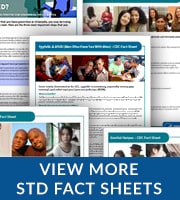

Edited by Jeffrey Guard
This "normalization" of bareback sex culture has proliferated across social media and apps with both professional adult performers and non-professional adult performers showcasing their sexual behavior. This resource article is designed to answer some key questions and provide information and links that can help you know and manage the risks when engaging in Bareback (Condomless) Sex. The article below is a compilation of resources designed to help folx understand the ins and outs of developing an approach to sex that can keep you as safe as possible.
The LOFT LGBTQ+ Community Center does not endorse nor condemn the practice of condomless or bareback sex. We are a safe, sex-positive space where we use our platform to educate, advocate and empower our community with the necessary knowledge for each person to determine what is right for them.
What are sexually transmitted diseases (STD)s/ sexually transmitted infections (STI)s?
Sexually transmitted diseases (STDs) or sexually transmitted infections (STIs) are used interchangeably and both refer to diseases that can be passed from one person to another through intimate physical contact and sexual activity. STDs are very common in the United States—half of all sexually active people will get an STD by age 25.
Am I at risk for STDs?
While anyone who has sex can get an STD, sexually active gay, bisexual and other men who have sex with men (MSM) are at greater risk. In addition to having higher rates of syphilis, more than half of all new HIV infections occur among MSM. Many factors contribute to the higher rates of STDs among MSM:
- Higher rates of HIV and STDs among MSM increase a person’s risk of coming into contact with an infected partner and becoming infected themselves.
- Certain behaviors – such as not using condoms regularly and having anal sex – increase STD risk.
- Homophobia, stigma and discrimination can negatively influence the health of gay and bisexual men.
How are STDs spread?
STDs are spread through sexual contact with someone who has an STD. Sexual contact includes oral, anal and vaginal sex, as well as genital skin-to-skin contact.
Some STDs—like HIV, chlamydia and gonorrhea—are spread through sexual fluids, like semen. Other STDs, including HIV and hepatitis B, are also spread through blood. Genital herpes, syphilis, and human papillomavirus (HPV) are most often spread through genital skin-to-skin contact.
How will I know if I have an STD?
Most STDs have no signs or symptoms. You or your partner could be infected and not know it. The only way to know your STD status is to get tested. You can search for a clinic here. Having an STD, such as herpes, syphilis, or gonorrhea, may make it easier to get HIV. It’s important to get tested to protect your health and the health of your partner. CDC recommends sexually active gay and bisexual men get tested for:
- HIV at least once a year;
- Syphilis;
- Hepatitis B;
- Hepatitis C based on risk factors;
- Chlamydia and gonorrhea of the rectum if you’ve had receptive anal sex (been a “bottom”) in the past year;
- Chlamydia and gonorrhea of the penis if you have had insertive anal sex (been a “top”) or received oral sex in the past year;
- Gonorrhea of the throat if you’ve performed oral sex (i.e., your mouth on your partner’s penis, vagina, or anus) in the past year;
- Sometimes, your healthcare provider may suggest a herpes test.
Your healthcare provider can offer you the best care if you discuss your sexual history openly. You should have a provider you are comfortable with. You can also visit GetTested to find a confidential, free or low-cost STD testing location near you.
Can STDs be treated?
Some STDs, like gonorrhea, chlamydia and syphilis, can be cured with medication. If you are ever treated for an STD, be sure to finish all of your medicine, even if you feel better. Your partner should be tested and treated, too. It is important to remember that you are at risk for the same or a new STD every time you have sex without using a condom and/or have sex with someone who has an STD.
STDs like herpes and HIV cannot be cured, but medicines can be prescribed to manage symptoms.
How can I protect myself?
For anyone, choosing to be sexually active means you are at risk for STDs. However, there are many things you can do to protect your health. You can learn about how STDs are spread and how you can reduce your risk of getting infected.
- Get Vaccinated: Gay and bisexual men are at greater risk for hepatitis A and B, and human papillomavirus (HPV). For this reason, CDC recommends that you get vaccinated against hepatitis A and B. The HPV vaccine is also recommended for men up to age 26.
.
- Consider DOXY PrEP/PEP: DoxyPrEP involves taking daily doxycycline as pre-exposure prophylaxis for bacterial STIs. DoxyPEP involves taking doxycycline as post-exposure prophylaxis for bacterial STIs between 24 and 72 hours after an episode of sex without a condom. This is a relatively new procedure and requires a prescription by your primary care provider.
.
- Go on PrEP: PrEP (pre-exposure prophylaxis) is medicine people at risk for HIV take to prevent getting HIV from sex or injection drug use. When taken as prescribed, PrEP is highly effective for preventing HIV. Read more here..
.
- Go on PEP--if you had bareback /condomless sex: PEP (post-exposure prophylaxis) means taking medicine to prevent HIV after a possible exposure. PEP should be used only in emergency situations and must be started within 72 hours after a recent possible exposure to HIV. Read more here..
.
- Be Safer: Getting tested regularly and getting vaccinated are both important. There are other things you can also do to reduce your risk for STDs:
Get to know someone before having sex with them. Talk honestly about STDs and get tested—before you have sex.
Consider is using condoms when you feel uncertain or you have doubts about your sexual partner/s status.
Think twice about mixing alcohol and/or recreational drugs with sex. For example, when you’re drunk or high, you’re more likely to make decisions that put you at risk for an STD, such as having sex without using a condom. Limit your number of sex partners. You can lower your risk for STDs if you only have sex with one person who only has sex with you.
- Know Your Status: If you know your STD status, you can take steps to protect yourself and your partners.
- Have better sex. Did you know there are things you can do to reduce the tearing of delicate tissue around your pleasure areas? Learn all the ins and out with Dr. Carlton! Doctor Carlton's social media accounts focuses on all kinds of helpful and practical tips for anal care and other MSM sex topics.
Make TESTING part of your health routine!
To start the process and make an appointment contact Jamel Gray at [email protected] or call (914)-785-8214.
If you are unable to visit The LOFT during the appointment period, additional appointments can be scheduled on a different day and time either at The LOFT or an HVCS location. Contact HVCS to find out more.
I HAVE MORE QUESTIONS AND NEED HELP!
.
Where can I get more information?
CDC’s Gay and Bisexual Men’s Health page – Information for gay and bisexual men and other men who have sex with men
Ten Things Gay Men Should Discuss with Their Healthcare Providerexternal icon – Fact sheet from GLMA
Fenway Healthexternal icon – Safer sex information from Fenway Health
The LGBT National Help Centerexternal icon – LGBT support and referrals
AIDS.govexternal icon – HIV/AIDS information and resources from the U.S. Department of Health and Human Services
The BODY Pro/ HIV/AIDS Resource Guide: Information regarding DOXY PrEP/PEP
References:
Centers for Disease Control and Prevention. Sexually Transmitted Disease Surveillance, 2019. Atlanta, GA: Department of Health and Human Services; April 2021.
CDC. Diagnoses of HIV infection in the United States and dependent areas, 2017pdf icon. HIV Surveillance Report 2018;29.
Centers for Disease Control and Prevention. Recommendations on the Use of Quadrivalent Human Papillomavirus Vaccine in Males — Advisory Committee on Immunization Practices (ACIP), 2011. MMWR 2011; 60(50). Accessed April 2, 2013.




